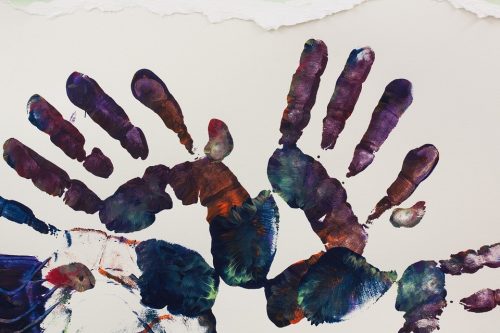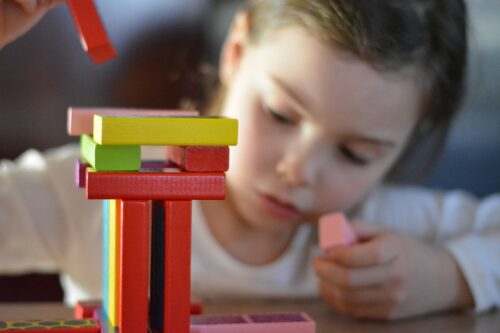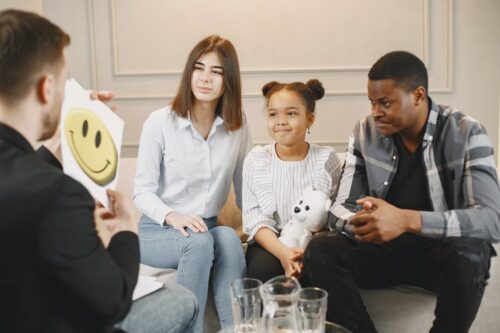
How can amusement treatment help kids when acting up more than usual?
How beneficial is this therapy for early child centered development?
Does it improve kids’ emotional and mental health?
Can parents use it to their advantage?
Let’s discuss a particular way how parents can solve matters on this issue.
A child’s biological tendencies do not begin with logical thought—though this does come with time. Children are driven by their impulses, sensations, and day-to-day happenings. — Melinda S. Malher-Moran, MA, LMHC, BC-DMT
Play Therapy
According to mental health professionals or play therapists, negative behavior can stem from a lot of things.
If you and your spouse have marital issues and are on the verge of getting a divorce, the offspring may resort to being rebellious to show that they’re in distress. It becomes one of the child’s problems.
The trained play therapists or licensed mental health professionals added that if someone dies within the family, children can become irritable and lose interest in mingling with people or participating in class.
Fortunately, child-centered play therapy work, also known as cognitive behavioral play therapy, animal-assisted play therapy, directive play therapy, sand play therapy, or child play, can help resolve psychosocial difficulties and handle unresolved trauma.
According to trained play therapists, as much as you try to keep a kid out of the drama, he or she remains in the heart of it as it becomes their thought process.
Worse, they cannot understand what’s happening around them, so the mixed feelings or emotions affect their attitude.
Once you can’t get through to your child, it’s time to change the coping strategies and process and contact a licensed mental health professional who can do that. That’s where the benefit of child-centered play therapy practice becomes handy.
The centered play therapy counselor will most likely subject him or her to kids and play therapy sessions, which is fitting for kids of all ages, using stuffed animals or sand trays.
This therapy is a form of treatment that focuses on attention deficit or deficit hyperactivity. The essentials of learning what therapeutic amusement can do to your little one are a must.

Play Therapy
Play Therapy Encourages Expression
Understanding How The Therapy Works
Play therapy experts believe that when a kid is born with other family members where the adults are too busy with their work to even tuck the youngsters in bed, it will be difficult to encourage them to speak about their issues.
However, the things that the children can’t voice out can be reflected through every illustration or painting they create during a journal of the play therapy session.

A registered play therapist RPT supervisor with the association for play therapy techniques will be able to interpret all the emotions and relay them to the guardian during sessions.
This way, the latter gets an idea of what the kid is stressing over and possibly resolves it.
Coping mechanisms like this will help the kids achieve optimal growth and improved social skills and problem-solving skills.
While the arts may sometimes be a form of amusement, encouraging individuals to express themselves through a painting, music, or dance involves an understanding of the media beyond the scope of amusement. — Cathy Malchiodi PhD, LPCC, LPAT, ATR-BC, REAT
Play Therapy Enhances Creativity
Benefit 1: Amusement Therapy Helps With Early Development
The first time a troubled child comes to the International Journal of Play, it is probable that all of their outputs may appear somewhat dark.
If the session required the kids to use a drum set, you could only hear the loud noise.
The artworks may either be indescribable or show sad images, too.
Once they act out a scene using dolls or robots, the concept may be about a mother spanking her kid, a student being mean to a classmate or other types of violence.
Thus, it is important to have a clear vision of what kind of activity in amusement therapy should be administered for the kid’s well-being.
Despite that, the more they attend adults therapy and understand family dynamics, the more their thoughts will improve.
The child gets to put himself in different points of view; that’s why their creations can lighten up, and the stories can have better endings.
Play therapy assists kids’ imagination and creativity.
Play Therapy Molds Skills
Benefit 2: Therapy Contribution To Brain Growth
While association for play therapy commences, a mental health professional or therapist will typically place the kid in a room full of construction toys, action figures, or hand puppets and leave them there for a bit to observe their behavior from the outside.
The therapeutic power of doing so is that the child can choose which one he or she will engage in initially.
Not only will amusement therapy help them go after what they want, but it also strengthens their ability to make decisions for themselves.

Play Therapy Supports Growth
Benefit 3: Therapy As Guide For Children’s Self-Awareness
Play therapy also teaches children how to own up to their actions, good or bad.
Though kids have free rein on all the toys used for the therapy, they are responsible for ensuring that none of them ends up broken.
If they either keep breaking items during their activity or lie about it, the registered play therapist might tell them the consequence of that and then serve it in case the child still won’t listen.
This way, children learn the importance of handling responsibility well during sessions.
Play Therapy
Part of providing therapy to children and families is re-education (what therapists call “psychoeducation”) about how mental illness becomes embedded in our close relationships, including parent-child, sibling, intimate/marital, and whole-family relationships. At the end of the day, parents are often responsible for getting children to and from appointments and organizing fees. If parents are not on board, therapy suffers. — Dillon Browne Ph.D.
Play Therapy FAQs
What are the four stages of amusement therapy?
What is an example of amusement therapy?
What is amusement therapy, and how does it work?
How do you start an amusement therapy session?
What are the methods and techniques of play therapy?
Does my child need play therapy?
What is play therapy?
How do I explain play therapy to my child?
What should my child wear to play therapy?
What is play therapy used for?
